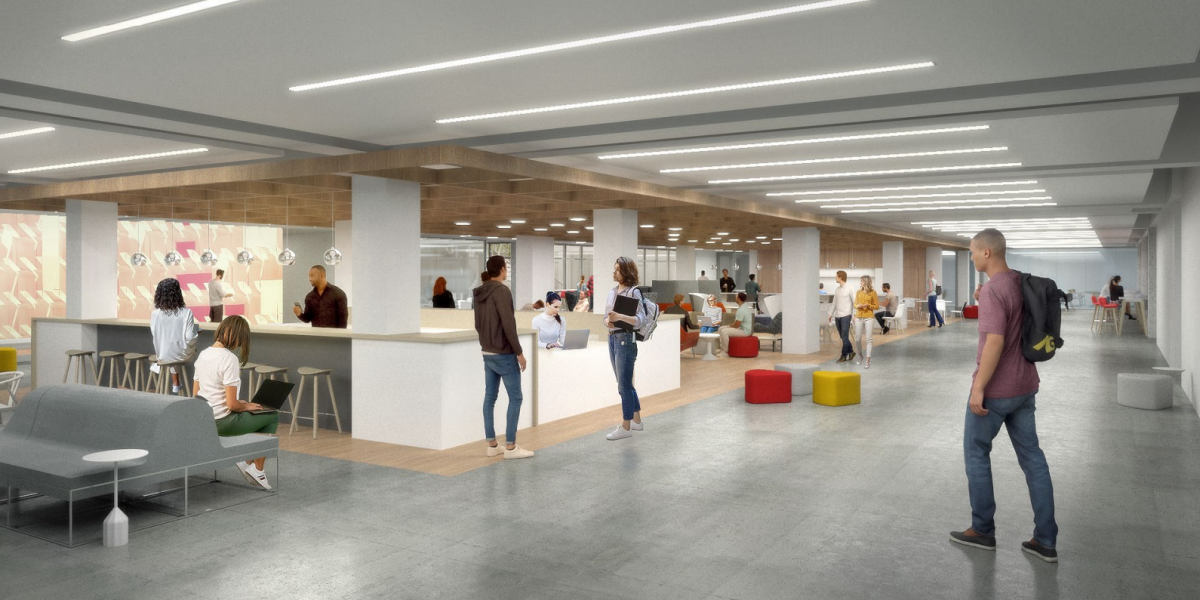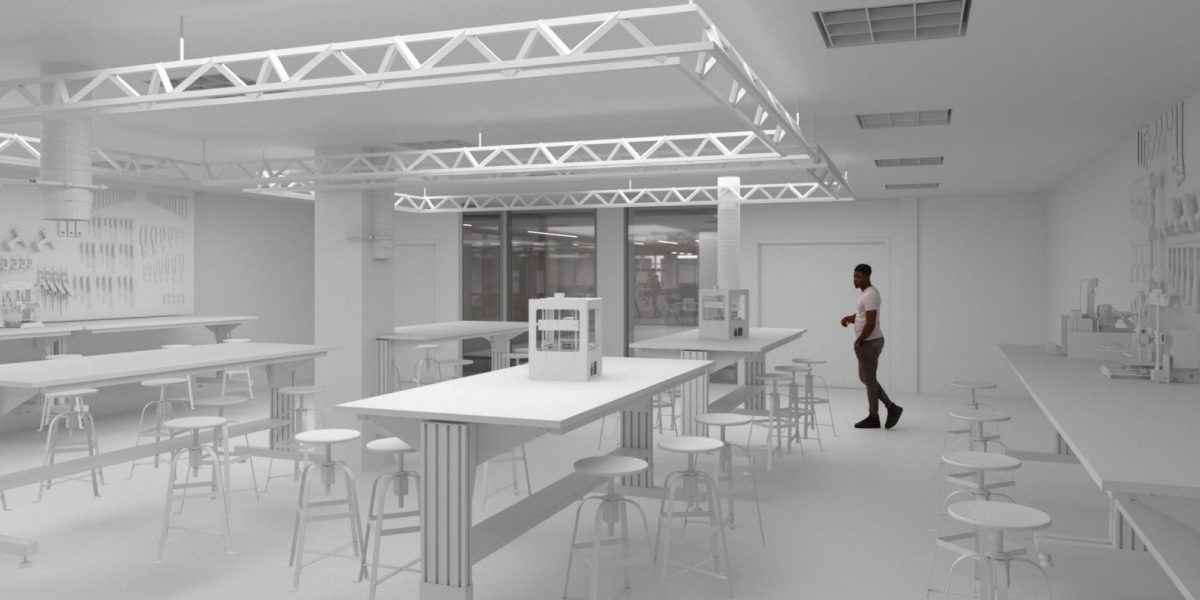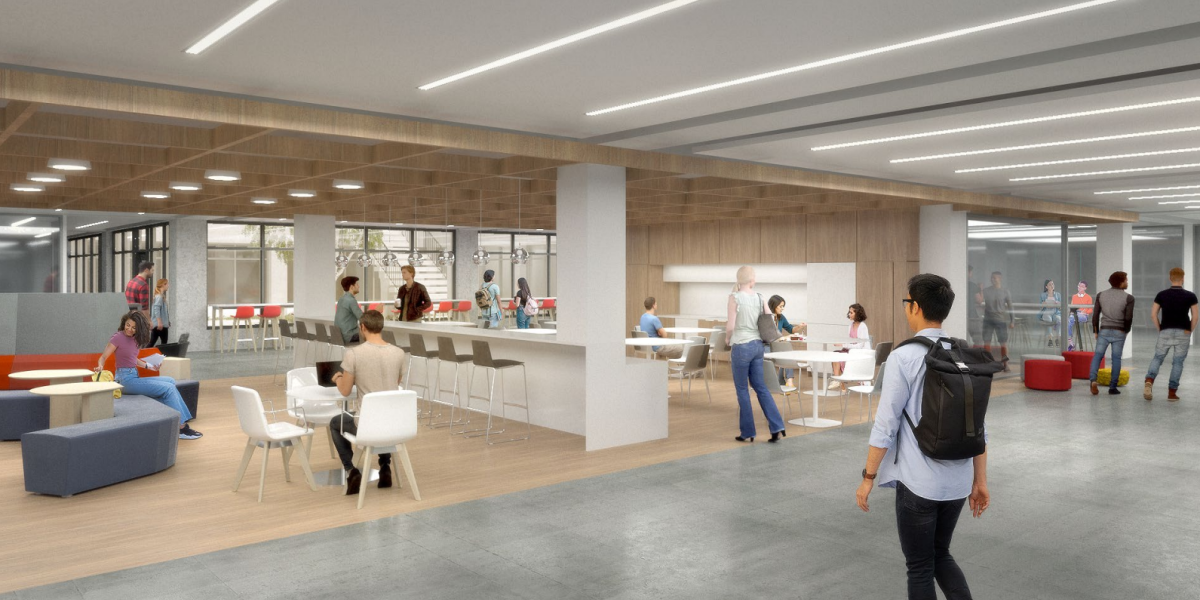Join us in developing the INFO Commons—the University of Maryland’s next great space—where students inspired by info, data, and tech can connect and discover.

Rendering of the INFO Commons Lounge
Just steps below Hornbake Library’s hushed stacks and special collections, a new space promises a student experience that’s anything but common: a playground for concocting—and building—big ideas; a tinkering lab for exploring assistive tech and IoT; real, community-led projects to make cities smarter and stronger; a social outpost, where students dish about new coding over pizza, create viral-worthy TikToks, or vie for the new high score in Mario Kart.
Virtual Tour
INFO Commons is the UMD College of Information’s (INFO’s) first brick-and-mortar gathering place for students to immerse themselves in the hands-on, creative world of information technology—on display through a dynamic patchwork of labs, amenities, and flexible space on the ground floor of Hornbake Library. A long-awaited community home for students across UMD who are passionate about information and technology, the INFO Commons will give students the freedom—and a place—to make, connect, and discover.
“It’s about having a place in between home and school where students don’t have prescribed roles,” said Katherine Izsak, Associate Dean for Strategic Initiatives. “It’s where playing is learning, and we know it works. They get their hands dirty and make those connections to what they’re learning in class. It’s dynamic and innovative, yes—but it’s also fun.”
“This space is not going to be neat, empty, or quiet, and that’s a good thing,” said Professor Wayne Lutters, Associate Dean for Faculty. “It’s a place for our students to come and feel like they belong, and a place they can call their own.”
At 25,000 square feet, the INFO Commons will offer a range of flexible spaces and unconventional programming to engage and support the INFO and UMD community. A large “swing space” connects labs specializing in IoT, gaming and AR/VR, prototyping, design, community engagement, and accessibility, with proximity to student and career services. Access to two outdoor courtyards offer natural communal spaces for small projects, group meetings, or quiet studying. On any given day, there may be a human-computer interaction class in the design lab or a course on social media influencers; students may be piecing together a desktop model of the internet or getting tutoring support in the campus computation center; a group may be feverishly sketching an idea on a whiteboard in the design lab, while a sea of bean bag chairs beckon others to experiment with gaming design. Floor-to-ceiling glass walls put the INFO Commons’ action and energy on display, and hopefully will encourage others to join in.
The practical experience and engagement with technology and people does more than offer fertile ground for learning—it sets the stage for the future workplace students want to make, rather than the one they’ll inherit. Grounded in interdisciplinary and experiential learning that connects students with communities, industry, and their peers in other colleges, the INFO Commons models the cultural shift needed to build the innovative, equitable, and accessible systems that benefit the common good.
“That energy is contagious,” said former Dean Keith Marzullo. “When I bring people in and show them students working, excited about what they’re learning and making, they want to be part of it. THIS is what the University of Maryland INFO College does.”
Featured Student Spaces

Rendering of the INFO Commons Design Studio and Prototyping Lab
Design Studio and Prototyping Lab
In a glass-enclosed room, a cohort of Converse-clad people enthusiastically lob ideas back and forth from comfy couches as another wildly sketches on a giant whiteboard. This isn’t a scene out of HBO’s “Silicon Valley,” a Google HQ brain drain, or a rousing game of Pictionary. It’s the INFO Commons’ new Design Studio, a dynamic space for bold ideas, project work and client engagement.
It’s also the springboard for the Prototyping Lab, a configurable make-and-take workshop where shelves of equipment, 3D printers, and tool-covered pegboards flank large communal work tables for experimenting and prototyping. Whether part of a class, a club or an off-hours passion project, the Design Studio and Prototyping Lab provide the environment, tools and tech that brings ideas to life.
Internet-of-Things Lab
The INFO Commons IoT Lab has all the markings of a Silicon Valley Garage: racks of hardware blink in rapid succession alongside bins of cables, routers, and solar batteries. Smart tech—from lightbulbs and thermostats to Ring doorbells and Amazon Echos—mingle with Arduino circuit boards and fabrication tools, all begging to be taken apart, manipulated, and put back together again.
And that’s precisely the idea. Everything in the iOT Lab—from a live model of the entire internet to the portable lending kits of switches, routers and cables—is an invitation to touch and tinker, and a tangible way to connect with the concepts they’re learning in class. The lab’s revolving door of students build skills in ways both meaningful and fun, with mentorship opportunities, cyber competitions, and local community workshops on smart technology and home networks on the horizon. “I want students to feel empowered to deal with the emerging social practices enabled by the internet,” said Senior Lecturer Dennis Frezzo. [MTH2] “And is there any reason it can’t be fun?”
Gaming AR/VR Lab
For most people, playing video games is a way to socialize, de-stress and have fun. But for researchers, gaming is serious business: despite their pixelated composition, games are a deeply human experience that can influence learning outcomes, mental health, even how people adapt to new environments. The INFO Commons Games and AR/VR Lab offers the best of both worlds, where students explore immersive game design and how humans perceive and respond to different environments—using actual game play. Through controllers and conversation, students dig into aspects of the human-technology experience—concepts that will help them understand how people interact with designed objects and that will inform their work in creating accessible, ethical, and user-friendly apps, games, and other tech.
And when it comes to building community, the lab will be a real game-changer. “People walk in after they’ve had a bad day, and games just have a way of changing your perspective,” said Assistant Professor Caro Williams-Pierce. “They bring people together, and you end up with this really powerful, supportive community.”
Community Engagement Lab
The Community Engagement Lab won’t have the look and feel of a traditional lab space: hardware and assembly desks are swapped for welcoming couches and round tables, with city planners, local librarians and high school students mixing with INFO College students and faculty. In fact, it’s less a lab and more a collective, where faculty, students, local government, and community organizations converge to create positive community impact. At the Community Engagement Lab, community-university partnerships drive transformative, sustainable solutions that amplify existing community efforts: tools and tech that leverage data for safer streets and better health outcomes; educational opportunities that build interest in STEAM and tech; adaptation of existing technology to make it more useful and impactful; data tools that propel better policy and shared governance.
Rather than one-off projects, the lab will cultivate long-term relationships with communities across the state—with a focus on those that have been historically marginalized and disinvested. Faculty will work year-after-year with community organizations, infusing a constant flow of student capital and energy into real-world challenges. “Solutions don’t have to come out of a black box, they come from partnership and collaboration,” said Associate Professor Sheena Erete. “That’s the only way we’re going to get innovative solutions.”
C3 Campus Computing Center
Writing centers are a sought-after resource found on virtually every college campus in America today, helping students articulate ideas, organize thoughts, and boost their proficiency. Soon, the University of Maryland will have a place for students to enhance a different kind of literacy: the Campus Computing Center (C3) will be a university-wide resource for students within different disciplines and with different skill sets to gain support and proficiency in the in-demand worlds of coding and computing.
At C3, students can engage in workshops, drop-ins, and design activities at shared desks and huddle spaces, fostering a peer-supported, collaborative learning culture. Through a suite of student supports—including peer tutoring, computing enrichment, and computing short courses—C3 aims to recruit a diverse computing community, help students find academic success, and explore different interests and careers.
Learn More & Support

Rendering of the INFO Commons Kitchen
We’re just getting started. Here’s some more of what’s coming to the INFO Commons:
- ALL, The Assistive Learning Lab, where students can test and try assistive technologies
- Video/podcast start-up, with tutorials and equipment to make the next viral sensation
- Library Preservation “Wet” Lab, providing space and tools to learn the art of preserving rare and historical books, maps, and other materials
- Human-Computer Interaction (HCI) Technology Warehouse, offering shared resources across USM
Virtual Tour
INFO Commons is underway—get in on the ground floor.
To learn about how you can support the University of Maryland INFO College’s newest community space through naming opportunities, sponsorship, and more, contact SupportINFO@umd.edu.
Return to Giving


